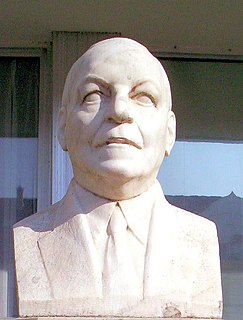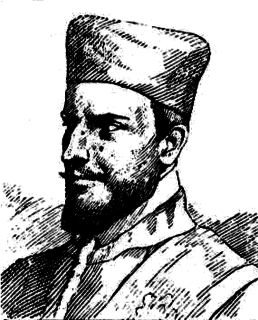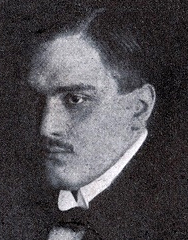Related Research Articles

The Land of Smiles is a romantic operetta in three acts by Franz Lehár. The German language libretto was by Ludwig Herzer and Fritz Löhner-Beda. The performance duration is about 100 minutes.

The Gay Hussars is an operetta in three acts by Emmerich Kálmán. The piece was Kalman's first operetta and a hit throughout Europe and America. The first version, in Hungarian, Tatárjárás, with libretto by Karl von Bakonyi and Andor Gábor, premiered at the Lustspieltheater in Budapest on 22 February 1908. The German version, Ein Herbstmanover, with libretto by K. von Bakonyi and Robert Bodanzky, premiered in Vienna on 22 January 1909. It was so popular that it prompted Kalman to move to Vienna.

Az obsitos is an operetta by Emmerich Kálmán. It has been performed under many different names.

Dantons Tod is an opera by Gottfried von Einem to a libretto by Boris Blacher and Gottfried von Einem after Georg Büchner's 1835 play of the same name. Its first performance took place in Salzburg on 6 August 1947. It was revised in 1955.

Indigo und die vierzig Räuber is an operetta composed by Johann Strauss II to a German libretto by Maximilian Steiner based on the tale "Ali Baba and the Forty Thieves" from The Book of One Thousand and One Nights.

Die Dollarprinzessin is an operetta by Leo Fall. The German libretto was by Alfred Maria Willner and Fritz Grünbaum.

Ercole amante is an opera in a prologue and five acts by Francesco Cavalli. Its Italian libretto is by Francesco Buti, based on Sophocles' The Trachiniae and on the ninth book of Ovid's Metamorphoses. The first performance took place on 7 February 1662 in the Salle des Machines of the Tuileries in Paris.
Walzer aus Wien is a singspiel pasticcio in three acts, libretto by Alfred Maria Willner, Heinz Reichert and Ernst Marischka, music by Johann Strauss II (son), arranged by Erich Wolfgang Korngold and Julius Bittner, first performed at the Stadttheater in Vienna on 30 October 1930. An English musical theatre adaptation called The Great Waltz played on Broadway in 1934, and another English version played in London in 1970.
Gräfin Dubarry is an operetta in three acts by Carl Millöcker to a German libretto by F. Zell and Richard Genée. The story concerns Madame du Barry, the mistress of Louis XV, King of France.

Cagliostro in Wien is an operetta in three acts by Johann Strauss II to a libretto by F. Zell and Richard Genée. It premiered on 27 February 1875 at the Theater an der Wien, featuring Marie Geistinger and Alexander Girardi.

Faust is an opera by the German composer Louis Spohr. The libretto, by Joseph Karl Bernard, is based on the legend of Faust; it is not influenced by Goethe's Faust, though Faust, Part One had been published in 1808. Instead, Bernard's libretto draws mainly on Faust plays and poems by Friedrich Maximilian Klinger and Heinrich von Kleist. Spohr's Faust is an important work in the history of German Romantic opera.

Der lustige Krieg is a three-act operetta composed by Johann Strauss II. The work was first performed on 25 November 1881 at the Theater an der Wien. Its libretto was by F Zell and Richard Genée. The operetta was well received at its premiere, and was performed 69 times during its first run.

Endlich allein is an operetta by composer Franz Lehár. It uses a German language libretto by A. M. Willner and Robert Bodanzky. It premiered on 30 January 1914 at the Theater an der Wien.

Der Göttergatte is an operetta, originally with a prelude and two acts, by composer Franz Lehár. It used a German language libretto by Viktor Léon and Leo Stein, and premiered on 20 January 1904 at the Carltheater in Vienna.

Flammen (Flames) is an opera in two acts and ten scenes composed by Erwin Schulhoff, his only opera. The original libretto in Czech was written by Karel Josef Beneš. The opera had its world premiere at the old National Theatre in Brno on 27 January 1932 in Czech under the title Plameny. It was not heard again until the mid-1990s, when it was performed in its German translation by Max Brod as Flammen. Its story is a surrealist retelling of the Don Juan legend with elements from the legend of the Wandering Jew, and heavily influenced by Freudian psychology. Unlike the title character in Mozart's Don Giovanni based on the same legend, Don Juan is not punished by being dragged down to Hell, but instead is condemned to live forever.
I due timidi is a one-act radio opera composed in 1950 by Nino Rota with libretto by the film writer Suso Cecchi d'Amico.

La bella dormente nel bosco is an opera in three acts by Ottorino Respighi to a libretto by Gian Bistolfi based on Charles Perrault's fairy tale "Sleeping Beauty".

Josef Ichhäuser(1852–1920), known by the stage name Josef Josephi (also spelled Joseffy), was a Polish-born singer (tenor-baritone) and actor.
References
- 1 2 Casaglia, Gherardo (2005). "Demofoonte, 6 January 1743" . L'Almanacco di Gherardo Casaglia (in Italian).
- ↑ http://www.theater-wien.at/index.php/de/spielplan/production/153436